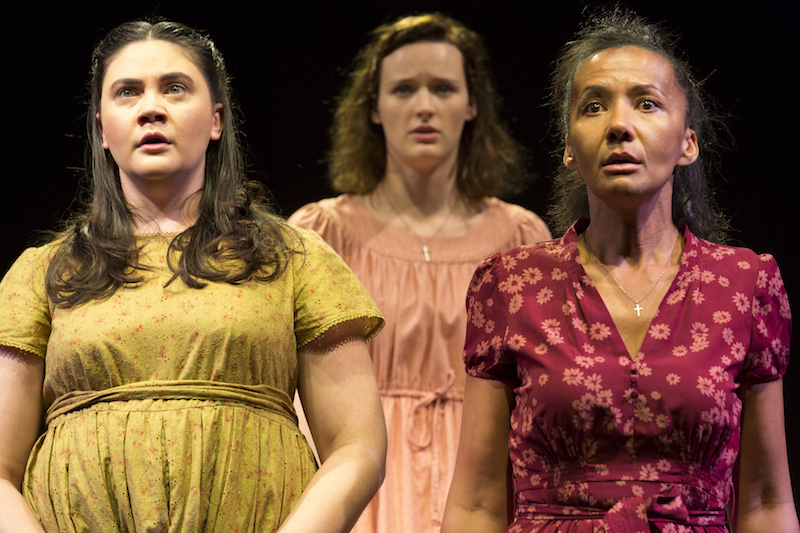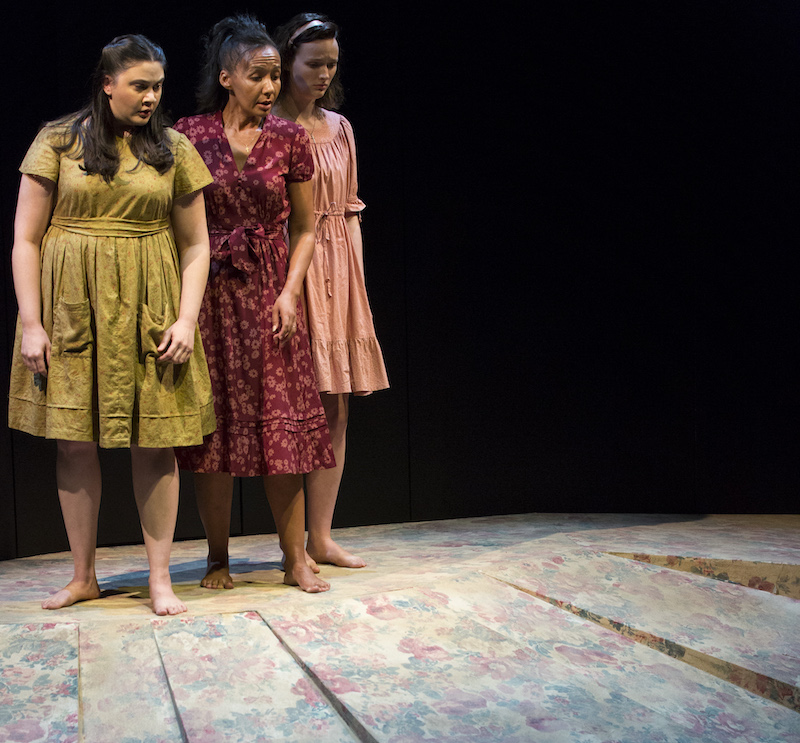Through darkness we hear a rumbling roar that thunders and thunders. And then as it suddenly stops, a dull light comes up on a woman in a cotton frock, flanked by two younger women. Over faint, eerie music, the woman speaks: “With a bullet through your neck, numbskull of yours never looked so fine.”
The younger women join in: “Rest in peace Daddy numbskull. Ta ta Daddy you sick bundle of shit. Bye bye Daddy you misery heap of shit.”
So begins Angus Cerini’s play The Bleeding Tree, a grittily lyrical “murder ballad” which starts – bang – with the slaying of a violently abusive man by his wife and two daughters, who have been driven to the point where they can take no more.
 Shari Sebbens, Airlie Dodds and Paula Arundell in The Bleeding Tree. Photo © Brett Boardman
Shari Sebbens, Airlie Dodds and Paula Arundell in The Bleeding Tree. Photo © Brett Boardman
The Gothic thriller was given its premiere by Griffin Theatre Company in 2015 after it won the 2014 Griffin Award for new Australian playwriting. Directed by Lee Lewis, the acclaimed production at Sydney’s Stables Theatre won Helpmann Awards for Best Play, Best Director and Best Female Actor (Paula Arundell) as well as Best New Australian Work at the Sydney Theatre Awards. Now Sydney Theatre Company is restaging Lewis’s production with the original cast: Arundell, Shari Sebbens and Airlie Dodds.
Set in a farmhouse, some distance from a town in rural Australia, The Bleeding Tree begins just as the three unnamed women have taken their revenge on their abuser. Once again, the old bastard had staggered home drunk, snarling aggressively, but this time he was met with a crack in the shins, a whack on the head and a bullet in the brain. Now, these Three Furies must dispose of his body.
Speaking in the first person they share the narration of the story, talking as themselves, while also giving voice to the man of the house and the townsfolk who visit when he goes missing.
Mr Jones, the first person to come looking for him, tells the women pointedly that after three days hanging in a tree in this heat, there’s not much left of a body after the flies and other creatures have devoured the flesh. And so, they decide to string him up on the tree in the backyard – a ritual with which to free themselves of him.
The extraordinary, heightened, visceral writing by Melbourne-based Cerini has a strange, brutal poetry to it, with grisly images conjured so graphically they spring to vivid life in the mind’s eye. The rhythmical language is laced with profanities and a dark, irreverent humour, which acts like the valve on a pressure cook to relieve tension. There is a real pleasure to be had in its warped, grotesque beauty.
 Shari Sebbens, Paula Arundell and Airlie Dodds in The Bleeding Tree. Photograph © Brett Boardman
Shari Sebbens, Paula Arundell and Airlie Dodds in The Bleeding Tree. Photograph © Brett Boardman
Designed by Renée Mulder, the set consists of a steeply raked, ribbed stage covered in a pattern of roses, which suggests wallpaper or dusty curtains in an old homestead but also relates to the longed-for rose garden the mother plans to grow using a broth from the old bastard’s bones. He too loved roses, but he mistreated them as he did everything and everyone else.
For my money, the set works better here than it did in the smaller Stables Theatre (Griffin’s home) where it looked more precipitous and sharply angled – precariously so for the actors at times, which was distracting. Here, that isn’t an issue and the perspective is better for the audience (from my seat anyway).
Verity Hampson’s moody, evocative lighting marks the passage of the three days, while Steve Toulmin’s sound design creates plenty of ominous atmosphere and reflects the rising hopes of the women.
Staged with stark simplicity on the striking set, Lewis’s razor-sharp direction puts the focus firmly on the language, which is delivered with passion and precision by the three actors, almost as if they are harmonising on a song.
Arundell, Sebbens and Dodds all give raw, powerhouse performances, that reach deep into the suffering they have been subjected to, now manifested as fierce anger, using ugly language that echoes that of their tormentor. If anything, their performances are even stronger than previously.
The Bleeding Tree asks questions about domestic violence and how we, as a society, deal with it. And the statistics are frightening in Australia. When the play premiered in August 2015, more than 40 women had already been killed that year in Australia by men. The STC programme quotes various statistics including the fact that, on average, Australian police deal with a family violence matter every two minutes.
Here, sympathetic neighbours, glad that he is gone, turn a blind eye to what the women have done, just as they turned to blind eye to the man’s abusive behaviour. Dodds’ character worries about the murder, and whether they will go to hell (even though their life has been a living hell), but mostly revenge is sweet.
The Bleeding Tree examines a dark, timely subject. But as Lewis said when the play premiered, Cerini offers us a hopeful story where the women don’t die.
The Bleeding Tree plays at Wharf 1 until April 8











Comments
Log in to join the conversation.